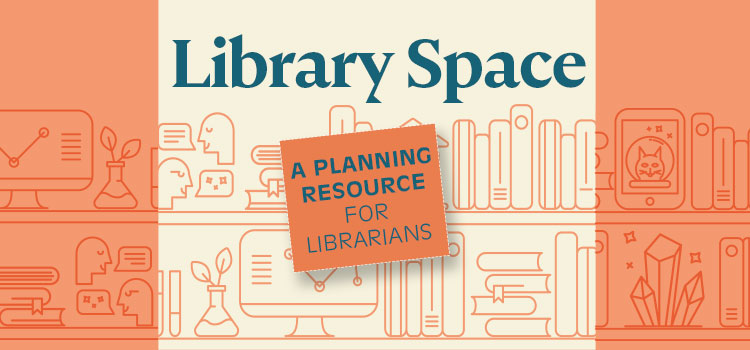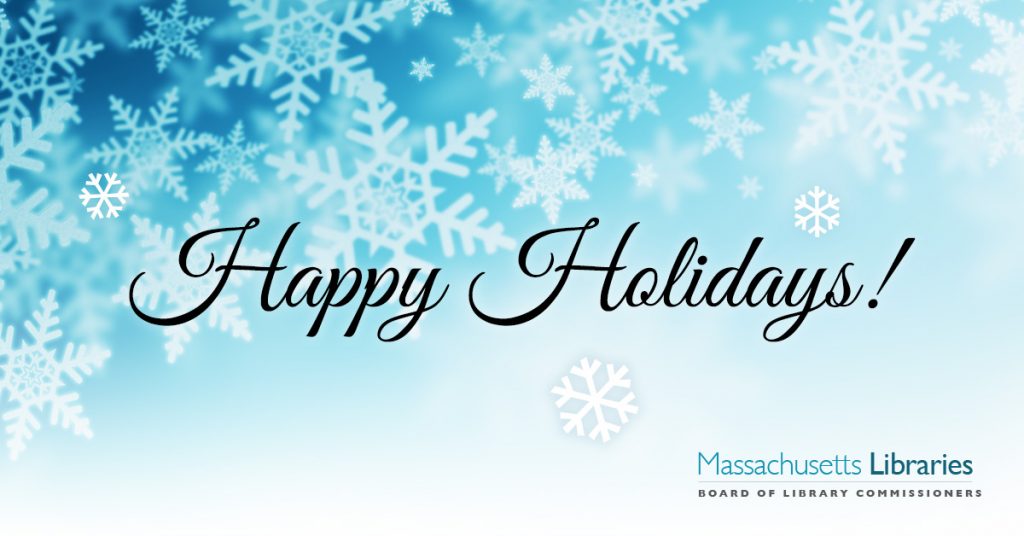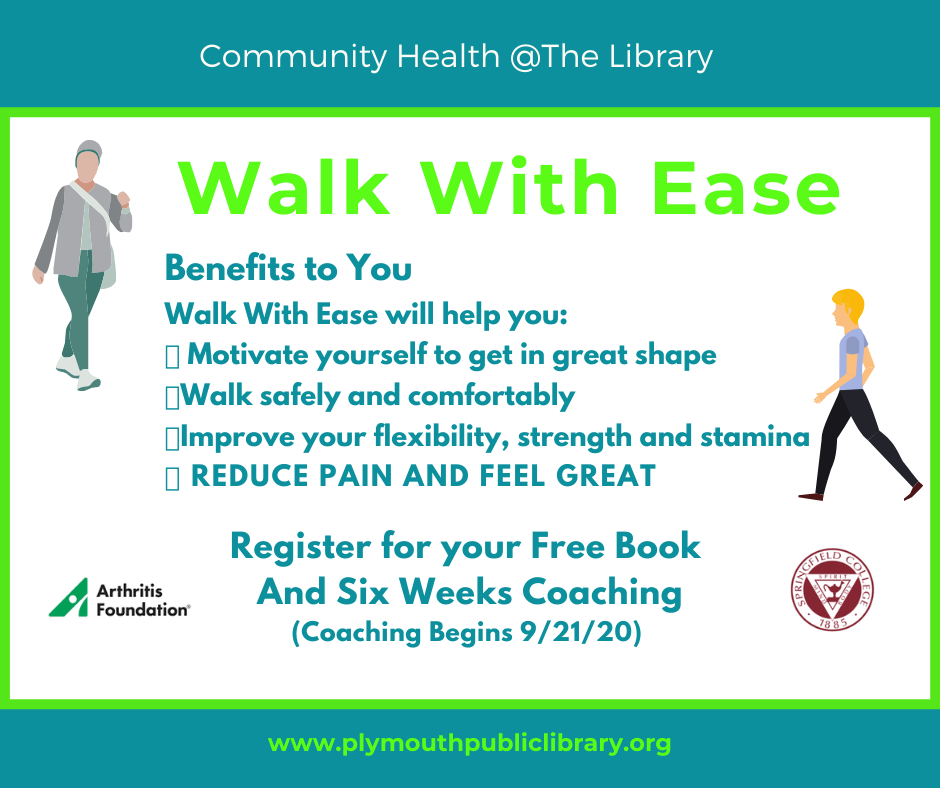Librarian Kay Lyons has journeyed with local children for almost three decades to places like Wonderland, Narnia and Hogwarts School of Witchcraft and Wizardry, but when she retires in March, it’s her turn. She and her husband, Rick Roy, will take some trips of their own, though never forgetting the joy she’s known.
Author: June Thammasnong
-
Plymouth Public Library Director Jennifer Harris retiring
After nearly three decades of service to the town, the director of the Plymouth Public Library is moving on.
But Jennifer Harris will continue to work in support of libraries in retirement and may get even more involved in local government.
-
Library Space During the Pandemic and Beyond

By Lauren Stara and Andrea Bunker, Library Building Specialists at the MBLC
Libraries all over the world are striving to satisfy the needs of their patrons during this pandemic, some in buildings and spaces that were inadequate prior to these unprecedented times. The staff of the Massachusetts Public Library Construction Program have been working to help librarians navigate their physical space needs and address pandemic related changes that may continue beyond these difficult times.
Last month, in collaboration with Sasaki, we released Library Space: A Planning Resource for Librarians, a planning tool that creates a formal set of best practices for designing library space that may be applied to libraries across the nation. The guide empowers librarians, administrators, space planners, and architects with tools for the planning and design of public library buildings. Early in December, we added a 4-page Pandemic Addendum, which aims to capture the knowledge and lessons learned from experts and practitioners who have been in the trenches of pandemic library services.
On December 10, 2020, we held a virtual “guided tour” of the document, to introduce the concepts and answer questions. We had representation from all types of libraries, – public, academic, and special, and librarians participated from all over the country, including from Georgia, Oregon, and Hawaii. The questions were thought-provoking, and many were focused on the Pandemic Addendum – not surprising since we’re all focused on the potential for lasting changes in the wake of COVID-19.
The core tenet of the main document, though, holds true in the addendum as well: planning with flexibility in mind.
Library services are changing and evolving at an astonishing rate, and bricks-and-mortar buildings are often not designed to keep up. This reality was spotlighted in 2020, as library buildings closed and later reopened with limited services and often jury-rigged barriers and pathways. Librarians improvised quarantine procedures for collections and figured out how to circulate materials with as little physical contact as possible. While we know the pandemic will end, we predict there are some services and considerations that will continue indefinitely:
- Curbside is here to stay: It’s so convenient for patrons that we don’t think the public will let us stop it. We need to modify or plan new buildings to accommodate amenities such as outdoor pickup lockers and walk-up or drive-through service points.
- Outdoor programming: We need to maximize the potential for activities that take advantage of fresh air when weather permits. Even in bad weather, an outdoor area with a roof and/or portable exterior heaters can work for library services just as well as for restaurants.
- Attention to HVAC and indoor air quality: Virus transmission is enabled by stagnant indoor air. We think new and renovated buildings will pay much closer attention to the design of their mechanical systems, and existing buildings should assess and upgrade their ventilation and filtration where possible.
- Furniture choices: While we look to hospital-grade furniture now, we think there will be a revolution in materials for furniture in the next few years, to increase the ability to clean and disinfect easily.
Many aspects of library design will remain the same, regardless of these extraordinary circumstances. Please visit the MBLC’s website to download both the main pdf and the Pandemic Addendum, or to view Library Space via ISSUU.
-
The JBPL Day After Christmas

By Patrick Marshall, Director of the Jonathan Bourne Public Library, Bourne, MA
The JBPL Day After Christmas (With apologies to Clement C. Moore)
Twas the day after Christmas, and all through Bourne
All the children were playing, while the parents were worn.
Paper wrappings and ribbons were scattered through the room;
While Mom sat there hoping someone would just grab a broom.
The teens were all playing X-Box on their beds;
Ignoring everyone for untold hours still ahead.
The little ones crying, not taking their naps;
How long were us parents to put up with this crap?
When at last we thought our sanity restored;
Here comes another child saying, “Mom! Dad! I’m bored”.
All of these toys, yet still nothing to do;
It just makes us want to cry, a hearty boo hoo.
I knew an idea was needed quite fast;
Something the family could do that’s a blast.
When what to my wondering eyes did appear,
An item that gave me ideas perfectly clear.
My wonderful Bourne issued CLAMS Library Card;
With so many services, choices would be hard.
Whether home or away, so much from which to choose;
The library would have something to chase away the blues.
New music! New movies! New audios and eBooks!
Magazines, newspapers, one must not overlook.
Away to the website, bournelibrary.org
I hope there is a video of the Pianist Victor Borge.
As I call the family over, we’ll have so much to do;
When we do things together, we are quite a crew.
So into the living room, the children they flew;
With their library cards at the ready to try something new.
We started with Freegal to dance to the Eagles;
But then went to hOOPLA for Snoopy, the Beagle.
On the website we searched, and were surprised to have found;
Qello offered concerts like Paul Simon’s Homeward Bound.
Tumblebooks offered us so many kids’ games,
I knew that our family time would never be the same.
We then went to Mango to learn a new language,
A mouthful of cookies gave us a disadvantage.
We then took a look at the database Great Courses;
Our daughter was hoping to learn about horses.
And though there was nothing much along those lines,
I did find one called “Great Meals in Less Time”.
We then took a look at the database Kanopy;
For we heard it contained some great documentaries.
And then it was back to the Overdrive app,
To find a good book while the dog sat in my lap.
We managed to find the book “Elf on the Shelf”;
And I laughed when I saw it, in spite of myself.
All of these resources, it just blew my mind;
I couldn’t believe the library was such a great find.
To get a library card, it’s not that much work;
Why, there are even sources for the kid’s homework.
As I looked at all the options, my face all aglow;
I wished to tell everyone what I now know.
The library offers so much service from home;
No matter if you use Mac, Firefox or Google Chrome.
I’ll end it with this, for I know it’s airtight;
The JBPL resources are just plain out of sight.
-
Happy Holidays from the MBLC

To Our Library Community and Partners,
This year has quite literally been one for the books. It’s created challenges we’ve never had to face but has made us grow closer and realize how much we need each other. You’ve had to reinvent library services and you deserve enormous respect for the many ways you’ve made it work.
As we continue to navigate this new normal, know that we’re so impressed with the creativity and resilience you’ve shown as you work to take care of yourself, those you love, and your community.
You are the reason people love their libraries and your health and safety are what matter most. On behalf of the Commissioners and staff of the MBLC, I wish you a healthy and safe holiday season and hope we can be together soon.
Mary Ann Cluggish, Chair
Massachusetts Board of Library Commissioners -
Walk With Ease: Program Opportunity With Positive Rewards

By Tom Cummiskey, Outreach Librarian at the Plymouth Public Library
Just before the COVID shutdown, I was notified by the Massachusetts Board of Library Commissioners of a program opportunity that sounded like it would fit nicely into the Consumer Health programming that I was spearheading at the library. After I spoke with Julia Chevan, the program coordinator at Springfield College Department of Physical Therapy, I requested 20 of the Walk With Ease guidebooks that would be distributed for free to patrons. Students in the physical therapy program at Springfield College would be using the material in 1:1 coaching sessions with patrons as part of the internship hours they needed.
The books arrived while we were furloughed, but when we came back in August I began to promote the program through our social media, the Center for Active Living, and a local news article. The response was surprisingly strong, and by Labor Day I requested eight additional books. Books were picked up by registrants at our curbside pickup area along with a welcome letter explaining how the program would work, and when the Springfield students would be contacting the registrants.
Students began contacting registrants the third week in September and for approximately six weeks, walkers and students began meeting virtually to review the material, learn strengthening and stretching exercises, and to offer walking tips, motivation and suggestions based on each person’s capabilities.
Once the program ended, I began to hear all sorts of glowing comments from the patrons, saying how wonderful and inspiring it was to work with such an enthusiastic group of students. Many reported that they were now able to walk with more confidence and assurance, all benefits of the program.
When I offered participants the opportunity to meet virtually on a monthly basis throughout the winter as a means of continual support, there was great interest. We had our first Zoom meeting for 30 minutes on December 2nd. This further connection provided an adjunct program opportunity without having to do much other than organize the Zoom session, send out the link, and then facilitate the group discussion among the eager participants. We will offer this monthly meeting through April, with the possibility of group activities once the “all clear” is given post-pandemic.
Feedback has all been positive for both the material presented in the book as well as the attentiveness and guidance of the physical therapy students at Springfield College. The Walk With Ease program is a fine example of a collaborative effort between public libraries and higher education institutions. Very little work was needed on our part to ensure participant success and it provided access to expertise and resources that would not have been locally available. If any other libraries are interested in offering this programming, they can contact Dr. Julia Chevan at Springfield College.
Tom Cummiskey, MLS
Outreach Librarian
Plymouth Public Library
Plymouth, MA 02360
-
Amherst council gets go-ahead to use $1M in CPA funds on Jones Library work
In a reversal from earlier in the year, the Community Preservation Act Committee is recommending that the Town Council use $1 million from the account for the proposed build-out of a new special collections room at the Jones Library.
-
Fundraising, naming opportunities still available at library
Despite all the challenges 2020 has brought, those organizing the effort to fund a new public library in Medford say there has been an outpouring of support from the community that has them quickly approaching their goal.
-
Reverting Back to Step 1, Phase III
By Rob Favini, Head of Library Advisory & Development at the MBLC
This week 134 communities in Massachusetts were reported as “high risk” communities by the Department of Public Health. Communities will revert to operations under Step 1 Phase III of the state’s reopening plan after being designated as high risk for three consecutive weeks in the Department of Public Health weekly reports. Reverting back to Step 1 Phase III should have minimal impact on libraries. The most notable change is building capacity being reduced to 40% occupancy. Curbside services are not impacted.
During the fall and winter months it is likely that more communities will revert to Step 1 Phase III due to increased community positivity results. Below are some helpful links and information to help you navigate the Commonwealth of Massachusetts’ COVID-19 Updates and Information page.
For a definition of “low risk community” and a list of communities not designated as low risk: https://www.mass.gov/info-details/covid-19-communities-in-step-1-of-phase-iii-not-designated-lower-risk
For an overview of allowable opening activity under Step 2 Phase III: https://www.mass.gov/news/baker-polito-administration-announces-transition-to-step-ii-of-phase-iii-for-lower-risk
Safety Standards and Checklists for Libraries: https://www.mass.gov/info-details/safety-standards-and-checklist-libraries
How community risk levels are determined: https://massgis.maps.arcgis.com/home/item.html?id=9f5b8ae8d0e24a1b98c55f704aaa24f3
The latest community level data reporting and risk designation, including map interface: https://www.mass.gov/info-details/community-level-covid-19-data-reporting
Frequently Asked Questions: https://www.mass.gov/info-details/covid-19-communities-in-step-1-of-phase-iii-not-designated-lower-risk#frequently-asked-questions-
When does a community revert from Step 2 of Phase III to Step 1 of Phase III?
A community must revert to Step I of Phase III of the Commonwealth’s reopening plan, as outlined in the Governor’s COVID-19 Order #51, when the community is designated in the “red” category for three consecutive weekly Department of Public Health weekly reports.When a community reverts from Step 2 to Step 1, what date is the reversion effective?
The rule changes go into effect the Monday after the data is posted. For example, if a community is red for the third week and the Department of Public Health posts the data on Thursday, then the rules go into effect on the following Monday.What changes when a community moves from Step 2 to Step 1 of Phase III?
The following types of businesses are prohibited from operating during Step 1 of Phase III: indoor performance venues, roller skating rinks, trampoline parks, obstacle courses, laser tag and escape rooms.The following types of businesses must reduce capacity to 40% (currently 50%) when operating during Step 1 of Phase III: driving/flight schools, gyms, libraries, museums, arcades, and lower-contact indoor and outdoor recreation businesses. During Step 1, outdoor gatherings at event venues and in public settings are limited to 50 people.
As always safety considerations for staff and library users are job one. Please remember to contact your local health department when making any decision regarding opening or modifying library building access and any expansion of library services.
Take care and be safe out there!
Update on 11/4/2020 at 3:00pm to clarify that towns were deemed “high risk”.
-
Special election to be held for book-loving kids
While the adults in their lives head to the polls to choose a president, kids across Massachusetts are being asked to participate in another type of election.
Starting Monday, at www.KidsVoteForBooks.com, young people can choose their favorite books and see if their choices are in the Top 25 when the votes are tallied. Voting is open through Nov. 9.